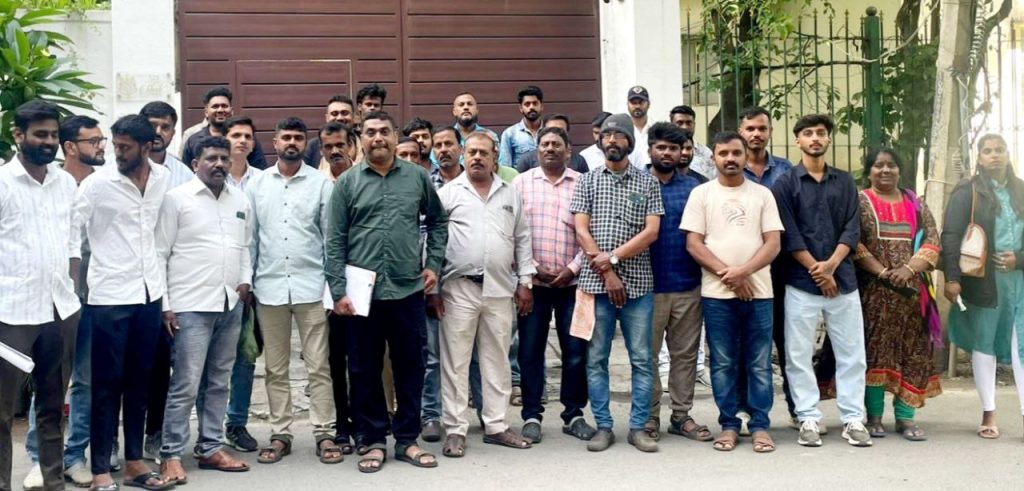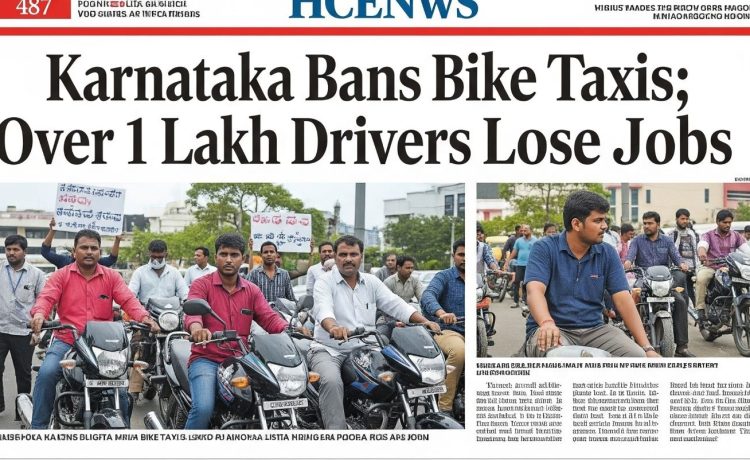Karnataka Bans Bike Taxis: Safety Concerns Clash with Livelihoods and Commuter Needs
High Court Upholds State’s Decision, Leaving Thousands in Limbo
Bengaluru, June 16, 2025: Karnataka has officially banned bike taxi services across the state, effective today, following a Karnataka High Court ruling that upheld the government’s decision to suspend operations until a formal regulatory framework is established. The move has forced ride-hailing platforms like Rapido and Uber to remove bike taxi options from their apps, leaving commuters and drivers scrambling for alternatives.
The court’s decision comes after a six-week interim relief period granted to bike taxi operators expired on June 15, with no extension permitted. Rapido confirmed the suspension in a message to users, stating, “We have halted bike taxi services in Karnataka in compliance with the court order. While we believe in the value of this service for daily commuters, we will fully adhere to the law and continue discussions with the government for a possible revival.”
Why the Ban? Safety, Regulation, and Industry Opposition
The primary reason cited for the ban is the lack of clear regulations governing bike taxis in Karnataka. Authorities have raised concerns over passenger safety, helmet compliance, vehicle conditions, driver licensing, and insurance coverage. Additionally, traditional auto and taxi unions have long opposed bike taxis, arguing that they operate without proper permits and undercut their earnings—already diminished post-pandemic and after the launch of the Shakti scheme, which offers women free bus travel.
“Bike taxis have been functioning without licenses, posing risks to passengers and unfairly competing with licensed transport providers,” said a transport department official.
Drivers and Commuters Bear the Brunt
For many, the ban spells financial disaster. Bike taxis had become a crucial income source for thousands, especially after the pandemic, offering an affordable and quick transport option in congested cities.
Mohammed Saleem, President of the Karnataka Bike Taxi Association, has appealed to Chief Minister Siddaramaiah and Congress leader Rahul Gandhi for intervention. “Over one lakh people have lost their jobs overnight,” he said. “Instead of a ban, the government should introduce regulations on permits, training, and insurance to ensure safe operations.”
Drivers like Ramesh Kumar, who relied on bike taxi earnings to pay rent and school fees, now face uncertainty. “This was my only income. If the government wants safety rules, they should implement them—not take away our livelihoods,” he said.
Commuters Left in the Lurch
Students, daily wage workers, and professionals who depended on bike taxis for their affordability and accessibility now face limited transport options, particularly in areas with poor public transit. “Bike taxis were a lifesaver during peak hours when autos refused short rides,” said Priya M., a college student. “Now, I’ll have to spend more on cabs or waste time waiting for buses.”
What’s Next? Calls for Regulation Over Prohibition
While the government stands firm on safety and legal grounds, stakeholders urge a middle path—implementing structured policies rather than an outright ban.
“The solution lies in regulation, not elimination,” argued transport expert Dr. Anil Shah. “Clear guidelines on permits, safety checks, and driver training can address concerns while preserving jobs and commuter convenience.”
As affected drivers and passengers await a resolution, the debate continues: Can Karnataka balance safety and livelihoods, or will the ban remain a roadblock for innovation and employment?

Key Quotes
Government Official (Transport Department):
“Our priority is passenger safety. Until clear regulations are in place, we cannot allow unlicensed bike taxis to operate. This is not just about competition—it’s about preventing accidents and ensuring accountability.”
Auto Union Leader (Karnataka Auto Drivers’ Association):
“Bike taxis have been eating into our earnings for years. They don’t pay taxes or follow fare rules. The ban is justified, but the government must also crack down on illegal cabs and ride-sharing violations.”
Bike Taxi Rider (Commuter Perspective):
“I used bike taxis daily because they’re fast and cost half of what autos charge. Now, I’m forced to spend more or walk long distances. The government should have regulated, not banned.”
Urban Mobility Expert:
“Karnataka’s ban is a step backward for last-mile connectivity. Cities like Delhi and Mumbai have regulated bike taxis—why can’t Bengaluru? This reflects poor policy foresight.”
Q&A: Understanding the Bike Taxi Ban
Q: Why did Karnataka ban bike taxis?
A: The state lacks a legal framework for bike taxis, raising concerns over safety, licensing, and insurance. Auto unions also pressured the government, claiming unfair competition.
Q: Who is most affected by this decision?
A: Three key groups:
-
Drivers – Thousands now unemployed overnight.
-
Commuters – Students, daily wage workers, and professionals lose an affordable option.
-
Platforms – Companies like Rapido and Uber lose a revenue stream.
Q: What alternatives do commuters have now?
A: Autos, cabs, and buses—but these are costlier, slower, or overcrowded. Many fear increased travel expenses.
Q: Is there a chance bike taxis will return?
A: Only if Karnataka introduces regulations. Rapido and Uber are lobbying for this, but progress depends on government action.
Q: How have other states handled bike taxis?
A: Delhi, Maharashtra, and Goa permit them with rules on permits, helmets, and fares. Karnataka could follow their model.
![]()











